# Models
# Overview
Props allow top-down communication with the widget - the widget's host uses attributes to pass data down to the hosted widget using attributes.
Events allow bottom-up communication with the host widget - the hosted widget emits events and the host widget can listen to them.
Models allow bi-directional communication by letting both the host and the hosted widgets update and read the same piece of data.
WHAT FOR?
Models are especially useful when developing generic input widgets.
For example, imagine a widget that wraps around a TextField widget to handle the controller logic in a black box, and
synchronize the text entered by the user with the host widget using z-model:
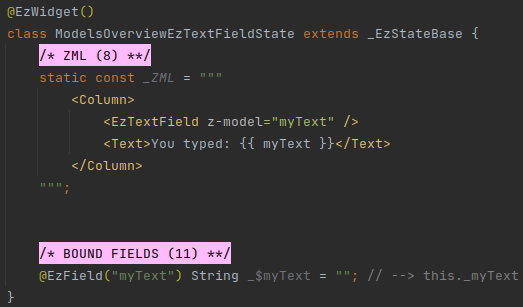
In the above example, a text field appears, and the text that is typed in it is rendered underneath.
Read about EzTextField and other useful ezFlap core widgets in Core Widgets.
The syntax of using z-model as a whole attribute rather than a prefix is explained under Syntax below.
# Example
We use the @EzModel annotation to define a model in the hosted widget:
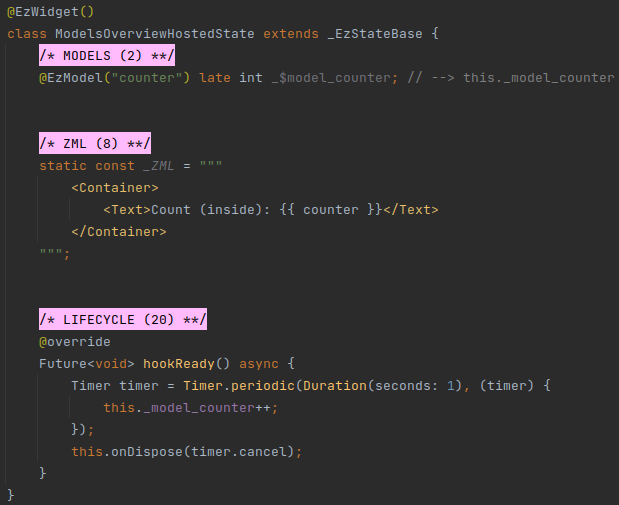
We use the z-model attribute prefix to pass a bound field of the host widget into the model of the hosted widget:
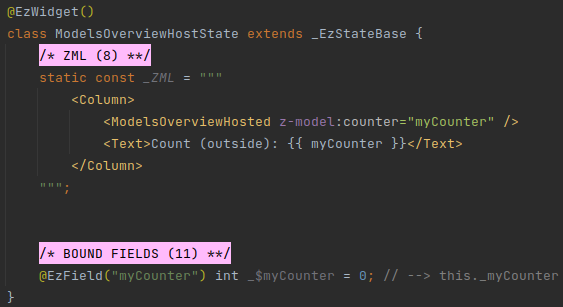
In the above example, the ModelsOverviewHost widget passes its myCounter bound field into the counter model of
the hosted ModelsOverviewHosted widget.
The ModelsOverviewHosted widget increments the model by 1 every second.
This change is reflected both in ModelsOverviewHosted (in the counter model) and in ModelsOverviewHost (in the
myCounter bound field).
# Reactivity
Models are reactive.
Whenever the value of a model changes, whether from inside the hosted widget or outside - the hosted widget's build()
method is called automatically, and the display is refreshed to reflect the new value.
# Mandatory Model
Models that are annotated with @EzModel are mandatory.
This means that they must be provided by the host widget if they are accessed by the hosted widget.
Mandatory models must be declared with late:
# Example
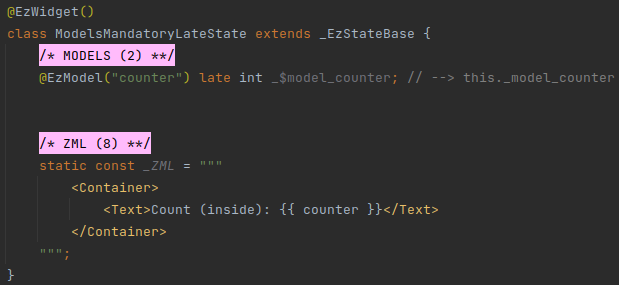
# Optional Model
Models can also be optional.
Optional models are annotated with the @EzOptionalModel annotation.
Host widgets pass data into optional models the same way they pass it into mandatory models: with the z-model
attribute prefix.
Optional models can be accessed by the hosted widget even when the host widget does not pass a value into them.
# Example
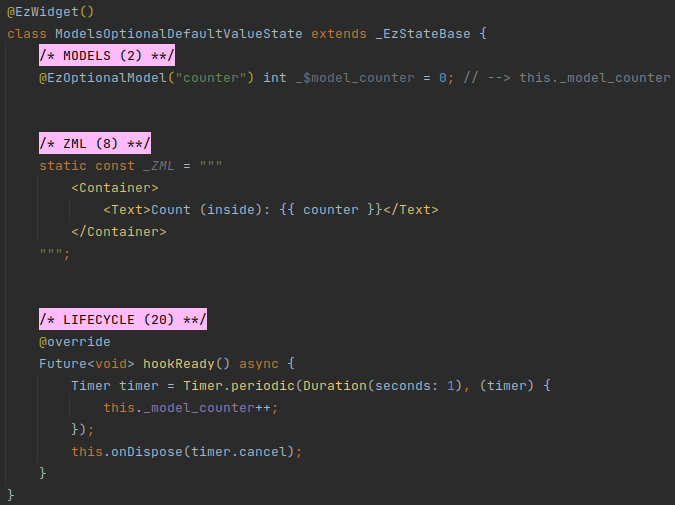
In the above example, if the host widget doesn't pass a value into the counter optional model, then ezFlap will
generate an "alternative" reactive variable to represent the model.
The hosted widget can render the model and modify it as if it were a "real" model passed down from the host.
Changes to the "fake" model will reflect in the UI as expected.
# Syntax
Models are defined using the @EzModel and @EzOptionalModel annotations.
Models are accessed using the z-model attribute prefix.
The name following z-model corresponds to the model's Assigned Name (which is, as usual, the string that is passed
as parameter to the @EzModel or @EzOptionalModel annotation).
One more variation exists.
There can exist a single unnamed model per widget.
To define an unnamed model - we use the @EzModel annotation without a parameter:
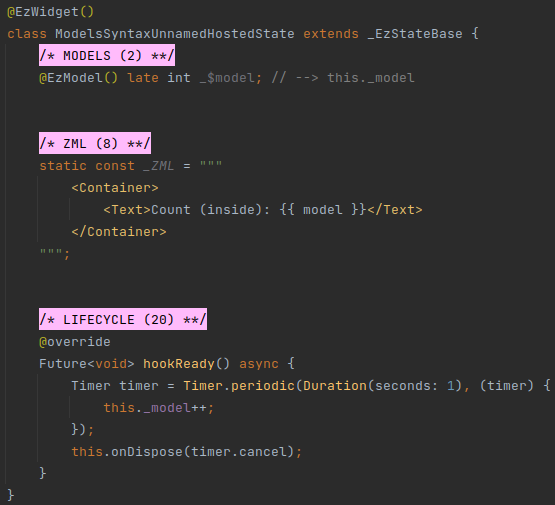
We use z-model as the entire attribute rather than just a prefix in order to pass data into an unnamed model:
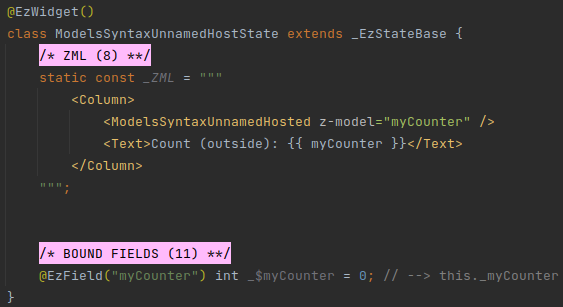
An unnamed model is automatically given the Assigned Name: model.
# Conventions
Strongly-recommended conventions that may become mandatory in a future version:
- The model's Assigned Name (the name provided as parameter to the
@EzModeland@EzOptionalModelannotations) should be in camelCase. - The model's name should begin with
_$model_, followed by the Assigned Name. - An unnamed model's name should be
_$model.
Optional suggested conventions:
- Place the
@EzModeland@EzOptionalModelannotations at the same line as the declaration. - Add a
// --> this._model_<Assigned Name>comment at the end of every model field declaration. - Use Live Templates to generate model declarations quickly and consistently, and without having to remember the syntax.
# Usage
Models can be used in the same places where bound fields and other reactive data can be used.
When used in code, a model is accessed using the Derived Name of its declaration.
The Derived Name is the text following the _$, prefixed with an underscore.
For example, the Derived Name of:
@EzModel("title") String? _$model_title;
Would be _model_title.
The Derived Name of:
@EzModel() String? _$model;
Would be _model.
# Check Existence
We can check if an optional model has actually been provided by the host:
if (this._model_title_isProvided()) {
// ...
}
2
3
# Check Type
A helper method to check the model's type is available for every model.
This can be useful when the model's field is of type dynamic, and the actual type of the data passed from the host
widget is only known at runtime, and we need to use different logic for different types (e.g. to do automatic type
conversions, etc).
For example:
if (this._model_title_isOfType<String>()) {
// ...
}
2
3